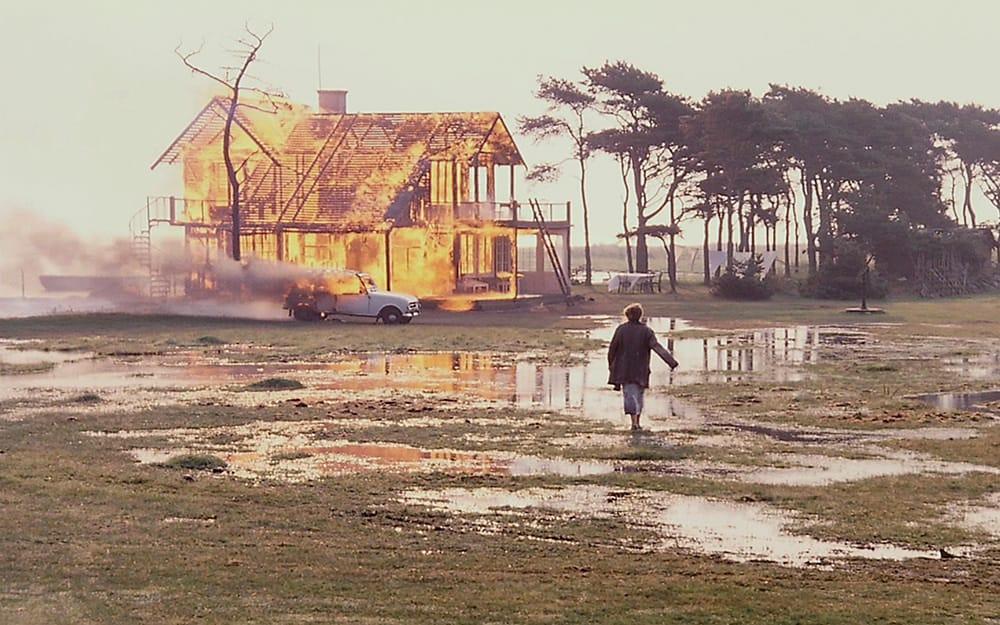The Sacrifice by Andrei Tarkovsky (Review)

There are very few directors that I find as intriguing, frustrating, and ultimately as rewarding as Andrei Tarkovsky. Intriguing becuase his approach to cinema was so precise, so methodical, and so at odds with everything that seems to be associated with movies today. Frustrating because the pace of his films makes 2001 seem glacial by comparison, they’re full of obtuse and surreal imagery, and their very nature seems antithetical to everything a 21st century moviegoer has come to expect from a moviewatching experience.
And yet, Tarkovsky, even at his seemingly most pretentious, is always rewarding. There are the technical details and aesthetics of his films, with their long, carefully composed takes and gorgeous yet haunting imagery (I don’t think I’ll ever be able to get the spectral landscapes in Stalker out of my mind). And then there are the themes that weave themselves through his films: the importance and impact of dreams and memories, and more importantly, the nature of truth and of the soul of man.
I’m not the first to say it, and I won’t be the last, but the thing that ultimately strikes me about Tarkovsky is his dogged belief in cinema’s unique ability to convey real, absolute Truth, and that as a filmmaker, it was his duty to plumb the depths of the human soul to find that Truth. Such a thing may not be readily apparent whilst watching his movies — I’ll confess to having fallen asleep during them before — and yet, his films seem as if they’re made with the assumption that the viewer will reflect and contemplate on them in the days to come.
In the case of The Sacrifice, I’ve found that I can’t not reflect on the film, such reflection coming close to breaking me down as I think about the beauty, the poignancy, and plea contained within Tarkovsky’s film.
The Sacrifice, also known as Offret, has often been labelled as Tarkovsky’s last will and testament, a final summation of all that he believed about filmmaking, as well as spirituality and humanity. Set in a remote location on the coast of Sweden, it focuses on Alexander (played by Erland Josephson), an older man who is a distinguished writer and philosopher (among other things). It is his birthday, and all of his friends and family have gathered at his beloved house to celebrate. Their celebration, however, is shattered when fighter jets scream overhead and news of war appears on the television.
The end of the world is nigh, it appears, and Alexander’s friends and family are thrown into chaos (for instance, his wife has a nervous breakdown and must be sedated). Alexander, on the other hand, suffers a spiritual breakdown. Earlier in the film, he admits to having no faith — for him, it seems, religion and God are philosophical and artistic ideas more than anything else. But faced with the death and destruction of all he knows and loves, Alexander finds himself incapable of doing anything else but pray, asking God to spare the world from the apocalypse. And in return, he’ll forsake everything — his job, his house, his friends, his wife, and most of all, his beloved son.
What follows is one of the most surreal segments in film I’ve seen all year. Alexander finds himself lost in a dream, meandering through a ruined churchyard, beset by scenes of riots and civil unrest, and finally, arriving in front of a witch’s house, convinced that he must sleep with her and forsake his beloved wife to save everything. It’s so surreal, in fact, that it casts doubt on all that has transpired before.
Throughout the film, Tarkovsky constantly pulls the viewer into a deeper world, and a deeper sense of spirituality, rhythm, and truth. His long, choreographed tracking shots lull the viewer, slowing them down to the film’s pace. The dialog can be portentous at times, ironic since Alexander has become tired of man’s constant ability to speak about the world’s problems but never do anything about them — but there are gems hidden there. Many of the speeches Alexander gives — about how he and his wife found their house, for instance — are taken from incidents in the director’s own life, making the film a far more personal statement than it would be otherwise.
However, it will always about the imagery for me. The gorgeously lensed scenes of civil unrest. The desolate countryside. Alexander floating in midair in the witch’s embrace as he commits what might be both the greatest betrayal and the greatest act of salvation. The use of mirrors and reflections to transform otherwise claustrophobic scenes into almost ethereal spaces. A house wrapped in flames. And finally, a shot of a gnarled tree waiting to bloom — a single, simple, indelible image that hints at the crown of thorns and the cross, symbols of the ultimate sacrifice, as well as the potential for new life, for rebirth and resurrection.
In interviews before his death, Tarkovsky stated that the greatest threat to the world was not war, but man’s increasing materialism — both in our consumerism and also our desire to master the world. Only through acts of self-sacrifice à la the Christian ideal could the world ever hope to be saved, could man hope to become better.
To hope that a movie, of all things, might convey such bald-faced, simplistic, and overwrought themes seems almost offensive today, but only because movies have been reduced so much that any movie containing such ideas comes off as mere propaganda. Propaganda The Sacrifice most certainly is not, but rather a deeply felt plea on the part of its creator.
Such audacity is yet another reason why I like and admire Tarkovsky so much.
